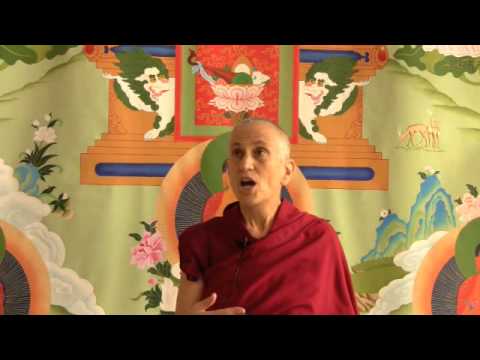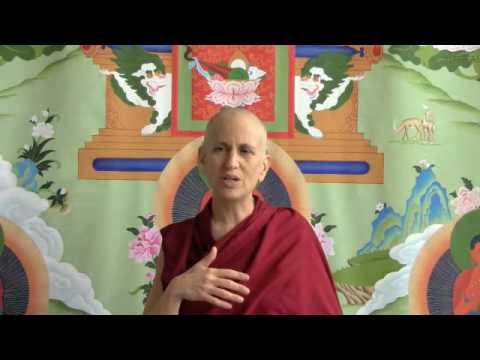The Buddha is free from fear
Part of a series of Bodhisattva's Breakfast Corner talks given during the Green Tara Winter Retreat from December 2009 to March 2010.
- Why his freedom from fear makes the Buddha a reliable refuge
- How anxiety and fear are related
Green Tara Retreat 036: Buddha has no fear (download)
I’ve been thinking about this question of what fear is for years in relationship to the Dharma. Even on this retreat, at the very beginning, I was meditating on death a lot: my own death, the death of people that are close to me, and some fear was coming up. I actually thought that was a good sign because I’ve meditated on death in the past and nothing has come up. In those times I thought, “Well, that either means you’re very spiritually realized or you don’t get it.” The option was I wasn’t getting it. Now the fear was coming up and I thought that it was actually quite helpful to do this meditation—not to scare myself but to prepare myself, to be aware that fear comes up.
For years in early days when I was listening to teachings, especially on refuge, the first thing to come up was, “Why is the Buddha a reliable source of refuge?” One, the Buddha is free from all fear. Two, the Buddha has skillful means to free others from fear as well. Then I thought, “Big deal!” Why, of all the Buddha’s fantastic qualities, have they picked freedom from fear as the main one? Like that’s the very first thing that makes the Buddha a reliable refuge? I’ve been puzzling over that for a long, long time. Slowly as my own understanding of Dharma grew it became clearer. The Buddhas are not afraid of dying—that’s impressive. The Buddha can free me from being afraid of dying—that’s good. The Buddha is not afraid of rebirth in the lower realms—well, I’m starting to get a little afraid of rebirth in the lower realms. Also, understanding more of the Buddha qualities you know the Buddha has no fear of all the miseries of cyclic existence—well, that’s starting to get more impressive. The Buddha’s not even afraid that the Buddha might be distracted by the bliss of liberation and head off in that direction. The Buddha’s not afraid because the Buddha’s not grasping at anything, at anything that is itself. So now I’m appreciating very strongly that freedom from fear is a big deal.
Clearly I was not so in touch with my own fear for a long, long time. Now that has changed and I’ve realized that anxiety and fear are actually related. I actually didn’t know that for a really long time. I knew I was anxious, but what does that have to do with fear? And in my own case, is this true? Certainly it’s true that while there is fear, there is self-grasping. Is it also true that where there is self-grasping, there is fear? It just naturally comes with it? I don’t know. It seems if you’re grasping at the self or grasping at anything and then attachment arises or an aversion arises, isn’t fear kind of mixed up in both of those things? Anyway, that’s the question I’m playing with personally at the moment. It’s very philosophical.
Personally I, like Kathleen, was raised by an anxious mother, who was raised by an anxious mother, who was raised by a tyrant. I think it is also a sign of anxiety when those control freaks (those of us who have that manifestation) are trying to manage our anxiety. And those of us who shrivel with fear are trying our best to manage our anxiety. I do both, which is kind of unfortunate. But I cannot blame my parents. I was famously a good baby, famous in the family. I didn’t cry very much. I slept through the night from the very beginning. I was easy to toilet train. They only had to tell me something once and I would never do it again. A friend of mine heard the story once and said, “Oh my God, you were a people-pleaser from the beginning.” I think that’s true. I came in wanting to please and really being quite afraid of admonishment or any kind of negative response—really quite afraid of that and quite afraid of anger. That is the very foundation of my attachment to my reputation, and that attachment to nice words and reassurance. It doesn’t even have to be praise, but reassurance. And my aversion to disapproval is really the seat of where pretty much all of my anxiety arises.
I do believe I came in with that. Then I grew up in conditions where that just fed it. Among the conditions was that I was the oldest of four children and the other three children were not good babies. So as often happens, the oldest child is the one in charge of all the other children. My anxiety was about wanting to please the adults and, “These kids are not behaving and it’s my job to keep them in line,” My anxiety about their behavior really got deeply ingrained. My mom was kind of equanimous about punishment so if one of us was in trouble, we were all in trouble. So it was really my job to keep everybody together. She called me the “Little General” after the Shirley Temple movie. So that was the persona I grew up with. She said it with affection and love, so I thought it was a good thing.
I never remember being punished as a child. I don’t think they needed to punish me because all you had to do was raise your eyebrow and I’m right there. But I did spend Sunday morning, Sunday night, and Wednesday night in church with my grandmother, who really wanted me to have a good foundation in life. We had a very gifted, dramatic preacher who preached three times a week on what happened to bad people: burning in hell, burning in hell, burning in hell, burning in hell. So that fear of punishment fed right into it. I still have that. There’s kind of this underlying fear of punishment all the time, that’s there in me.
So I would say those are the basics of my anxiety and as Venerable said when she first talked about this last week, it’s a habit. It’s definitely a habit of response. I think there is some other little cultural thing. Maybe it’s just for women, or maybe it’s just Southern, but this first response that’s like, “Help! Help! Somebody rescue me!” And people with the right kind of psychological makeup recognize that and come in and rescue you. If you don’t have people around you who are doing that for you, well then you just pick yourself up and carry on. But that’s the first response, “Help, help, help.”
Venerable Thubten Chonyi
Ven. Thubten Chonyi is a nun in the Tibetan Buddhist tradition. She has studied with Sravasti Abbey founder and abbess Ven. Thubten Chodron since 1996. She lives and trains at the Abbey, where she received novice ordination in 2008. She took full ordination at Fo Guang Shan in Taiwan in 2011. Ven. Chonyi regularly teaches Buddhism and meditation at the Unitarian Universalist Church of Spokane and, occasionally, in other locations as well.


